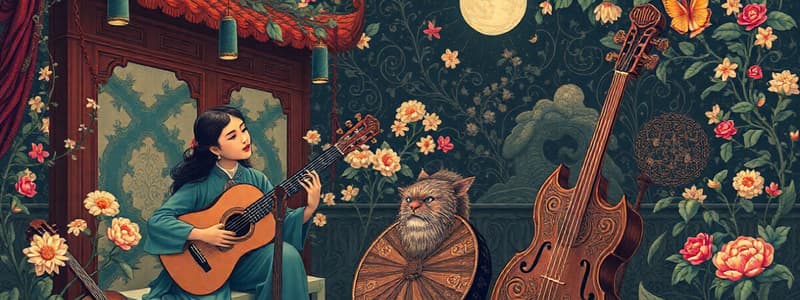Podcast
Questions and Answers
Which traditional music style is associated with Japan?
Which traditional music style is associated with Japan?
- Gagaku (correct)
- Vietnamese Folk Music
- Pansori
- Kunqu Opera
What method of sound production do plucked instruments fall under in instrument classification?
What method of sound production do plucked instruments fall under in instrument classification?
- String (correct)
- Percussion
- Vocal
- Wind
Why do regional variations in instrumentation occur in East Asian music?
Why do regional variations in instrumentation occur in East Asian music?
- To align with Western musical traditions
- Because of historical and cultural factors (correct)
- As a result of individual artist preferences
- Due to variations in music theory across regions
Which of the following functions does music frequently serve in East Asian cultures?
Which of the following functions does music frequently serve in East Asian cultures?
How do the theoretical foundations of music in East Asia differ from Western systems?
How do the theoretical foundations of music in East Asia differ from Western systems?
What instrument is traditionally used in Kunqu Opera?
What instrument is traditionally used in Kunqu Opera?
What distinguishes folk music styles in East Asia?
What distinguishes folk music styles in East Asia?
Which material aspect influences musical instrument construction in specific East Asian regions?
Which material aspect influences musical instrument construction in specific East Asian regions?
Which of the following best describes the characteristics of Gagaku music?
Which of the following best describes the characteristics of Gagaku music?
How does the classification of traditional East Asian music instruments most commonly occur?
How does the classification of traditional East Asian music instruments most commonly occur?
What is a common feature of the instrumental music found in traditional East Asian styles?
What is a common feature of the instrumental music found in traditional East Asian styles?
Which of the following statements is true about traditional Korean court music?
Which of the following statements is true about traditional Korean court music?
Which of the following instruments is classified as a wind instrument in East Asian music?
Which of the following instruments is classified as a wind instrument in East Asian music?
What role do percussion instruments typically play in East Asian music ensembles?
What role do percussion instruments typically play in East Asian music ensembles?
Which category of instruments includes the Chinese dizi?
Which category of instruments includes the Chinese dizi?
In East Asian music, what is often a significant factor affecting the performance practices?
In East Asian music, what is often a significant factor affecting the performance practices?
Flashcards
East Asian Music Traditions
East Asian Music Traditions
A wide variety of musical traditions found in China, Japan, Korea, and Vietnam, often blending vocal and instrumental performances with cultural narratives.
Traditional Music Styles
Traditional Music Styles
Different musical styles reflecting unique cultural identities and historical contexts, like Kunqu Opera, Gagaku, and Pansori.
Instrument Classification
Instrument Classification
Categorizing instruments based on how sound is produced (e.g., string, wind, percussion).
Regional Instrument Variations
Regional Instrument Variations
Signup and view all the flashcards
Cultural Significance of Music
Cultural Significance of Music
Signup and view all the flashcards
Music Theory in East Asia
Music Theory in East Asia
Signup and view all the flashcards
East Asian Instruments
East Asian Instruments
Signup and view all the flashcards
Musical Roles
Musical Roles
Signup and view all the flashcards
East Asian Music
East Asian Music
Signup and view all the flashcards
Aesthetic Values in East Asian Music
Aesthetic Values in East Asian Music
Signup and view all the flashcards
Role of Music in East Asian Culture
Role of Music in East Asian Culture
Signup and view all the flashcards
Oral Tradition in East Asian Music
Oral Tradition in East Asian Music
Signup and view all the flashcards
Zither
Zither
Signup and view all the flashcards
Flutes in East Asian Music
Flutes in East Asian Music
Signup and view all the flashcards
Percussion Instruments in East Asian Music
Percussion Instruments in East Asian Music
Signup and view all the flashcards
Reed Instruments in East Asian Music
Reed Instruments in East Asian Music
Signup and view all the flashcards
Study Notes
East Asian Music & Musical Instruments
- East Asian music encompasses a vast array of traditions, varying significantly across regions like China, Japan, Korea, and Vietnam.
- Traditional music frequently blends vocal and instrumental performances, often deeply intertwined with cultural narratives, rituals, and social practices.
- Various instruments are used across different musical styles, contributing to the diversity of the region's sonic landscape.
Traditional Music Styles
- Different styles represent distinct cultural identities and historical contexts.
- Examples include Kunqu Opera (China), Gagaku (Japan), Pansori (Korea), and various folk music styles.
- Styles often use specific instruments and melodic structures unique to the region.
- Music plays a significant role in ceremonies, festivals, and everyday life.
Instrument Classification
- Classification systems often categorize instruments based on their method of sound production, such as string, wind, percussion, or even plucked instruments.
- Different regional traditions might have slightly different classification schemes, aligning closely with their specific instrument inventories.
- Categories may vary depending on the specific tradition or descriptive system being used.
Regional Variations In Instrumentation
- Instrument inventories diverge considerably depending on geographical location.
- Specific instruments might be prevalent in certain regions due to historical and cultural factors.
- Different regions may find unique applications and adaptations of the same general instrument type.
- Instruments’ materials and construction techniques also vary regionally.
- The use of specific materials might reflect local resources and craft traditions.
Cultural Significance
- Music frequently serves multiple functions, such as storytelling, religious rituals, social gatherings, and entertainment.
- Some musical forms are highly associated with specific deities or spiritual practices.
- Performance of traditional music may be essential to maintaining cultural heritage and transmission of knowledge.
- Music forms can express specific emotional states and social contexts.
Music Theory In East Asia
- The theoretical foundations of music vary across East Asian countries, reflecting their rich history and unique cultural values.
- Concepts of harmony and melody may differ from Western systems, often emphasizing cyclical patterns and modes.
- The tonal systems are often built on modal structures as opposed to major-minor scales.
- Various musical concepts like rhythm, intonation, and improvisation are embedded within particular music traditions.
- East Asian music often utilizes different melodic and rhythmic structures compared to Western music traditions.
Studying That Suits You
Use AI to generate personalized quizzes and flashcards to suit your learning preferences.



